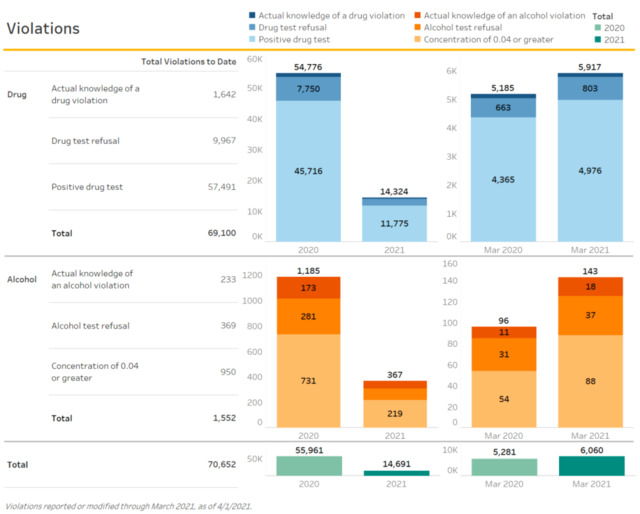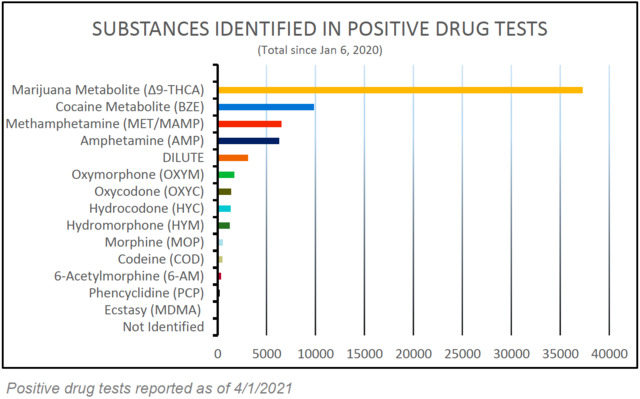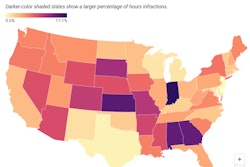As more drivers populate the Federal Motor Carrier Safety Administration’s Drug and Alcohol Clearinghouse, violations totals are growing at a steady clip. If the total drug and alcohol violations in this year's first quarter continue at the same pace, the year's total will grow by 5% over 2020's nearly 56,000 violations.
However, that trend isn't surprising, given the growth in registered users of the database. In the first quarter of 2021, almost 295,000 drivers were added, an 18% increase over the 1.6 million drivers registered in 2019 and 2020.
Positive drug tests account for most of the drug and alcohol violations recorded in the database, with marijuana by far being the most common. The federal data also counts refusals to take a test and "actual knowledge" of a drug or alcohol violation, meaning an employer has knowledge that a driver has used alcohol or controlled substances based on the employer’s direct observation of the employee, information provided by the driver’s previous employer(s), a traffic citation for driving a truck while under the influence of alcohol or drugs or an employee’s admission of alcohol or drug use.
As of April 1, there were more than 2.1 million users registered in the clearinghouse. In addition to drivers, it includes fleet representatives, consortia/third-party administrators, medical review officers and substance abuse professionals (SAPs).

Drivers who have a drug or alcohol violation recorded in the clearinghouse must complete the return-to-duty (RTD) process, which involves an evaluation by SAPs and a subsequent treatment plan, before they can get back behind the wheel.
FCMSA said as of April 1, there were 64,846 drivers in the RTD process with their status in the clearinghouse and only 10,609 of those had completed their RTD test with negative results. The remaining 54,237 drivers had either not started the RTD, were working with a counselor or were eligible to take their RTD test and had just not completed it.
In a year-end report, FMCSA said 52,000 drivers lost their jobs in 2020 due to drug and alcohol violations and most had not completed their RTD procedure. The report backed up industry concerns that the clearinghouse would be another factor in restricting the driver labor pool.
All trucking companies with operating authority, even with only one truck, are required to register in the clearinghouse and to conduct a yearly query on each driver. The database is used by law enforcement, driver licensing agencies and carriers to check for driver violations.
While none of the regulations regarding drug and alcohol testing and reporting have changed, the clearinghouse is starting to make it easier for fleets to conduct pre-employment screenings of their drivers.
Jared Rosenthal, founder and CEO of drug consortium Health Street, said fleets are required to look back three years when hiring a new driver. Prior to the clearinghouse, this has required reaching a driver’s previous employers to get their drug testing records. Now, for at least half of the required time period, that is done with a simple query of the driver’s CDL number in the database.
By January 2023, when the clearinghouse has been in place for three years, carriers will be able to conduct their pre-employment checks solely in the clearinghouse, Rosenthal added.
 Through March 2021, drug and alcohol violations are on pace to surpass the number of violations from 2020.Federal Motor Carrier Safety Administration
Through March 2021, drug and alcohol violations are on pace to surpass the number of violations from 2020.Federal Motor Carrier Safety Administration
Another benefit to the clearinghouse, Rosenthal said, is that it's more difficult for a driver to hide a failed drug test. “Obviously, there’s an incentive if you’re a driver who fails a test two years ago, maybe you don’t mention that you worked at that previous place,” he said.
Since the clearinghouse took effect at the beginning of 2020, through the end of March 2021 there were 69,100 total drug violations reported, which includes actual knowledge violations (1,642), drug test refusals (9,967) and positive drug tests (57,491). There were also 1,552 alcohol violations, which included actual knowledge violations (233), alcohol test refusals (369) and blood alcohol concentration of 0.04 or higher (950).
Through the first three months of 2021, there were 14,324 drug violations and 367 alcohol violations reported to the clearinghouse compared to 54,776 drug violations and 1,185 alcohol violations through all of 2020.
The majority of positive and refused drug tests occurred in pre-employment screenings and random drug tests, while most positive and refused alcohol tests were found via random tests and reasonable suspicion.
 Marijuana is far and away the most common substance responsible for failed drug tests among CDL holders, according to FMCSA's Drug and Alcohol Clearinghouse data.
Marijuana is far and away the most common substance responsible for failed drug tests among CDL holders, according to FMCSA's Drug and Alcohol Clearinghouse data.
Rosenthal said a big reason for the high number of marijuana test-positives is the rapidly changing laws at the state level across the country. While weed is legal in some states for recreational use, legal in others for medical use or not legal at all, it is still considered a Schedule I drug at the federal level, making it illegal for CDL holders in every state.
“My prediction is there is one thing that will change the law for sure, and that is the invention of a so-called ‘weedalyzer,’ so a breathalyzer for marijuana,” he said. “Nobody is supporting putting truckers on the road that are high, but the problem with this issue, legal or not, is we don’t know based on a drug test if you’re high at that moment.”










